新目标八年级下册 Unit 1六课时学案
- 格式:doc
- 大小:175.50 KB
- 文档页数:11
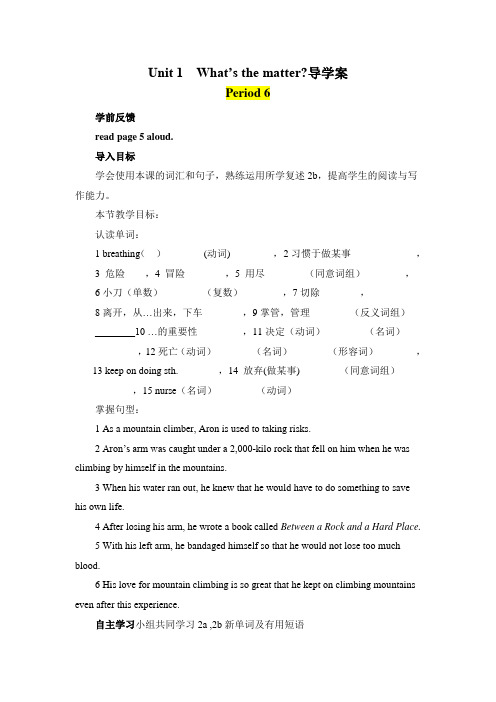
Unit 1 What’s the matter?导学案Period 6学前反馈read page 5 aloud.导入目标学会使用本课的词汇和句子,熟练运用所学复述2b,提高学生的阅读与写作能力。
本节教学目标:认读单词:1 breathing()________ (动词) ________,2习惯于做某事____________ ,3 危险____,4 冒险________,5 用尽________(同意词组)________,6小刀(单数)________(复数)________,7切除________,8离开,从…出来,下车________,9掌管,管理________(反义词组)________10 …的重要性________ ,11决定(动词)________(名词)________ ,12死亡(动词)________(名词)________(形容词)________,13 keep on doing sth.________,14 放弃(做某事)________(同意词组)________,15 nurse(名词)________(动词)________掌握句型:1 As a mountain climber, Aron is used to taking risks.2 Aron’s arm was caught under a 2,000-kilo rock that fell on him when he was climbing by himself in the mountains.3 When his water ran out, he knew that he would have to do something to save his own life.4 After losing his arm, he wrote a book called Between a Rock and a Hard Place.5 With his left arm, he bandaged himself so that he would not lose too much blood.6 His love for mountain climbing is so great that he kept on climbing mountains even after this experience.自主学习小组共同学习2a ,2b新单词及有用短语1呼吸困难_______________ 2 一个对爬山感兴趣的美国人__________ 3作为一名登山员__________ 4最令人兴奋的一件事_______________ 5丧生________________________ 6目的是________________________7一本叫《在岩石与险境间》的书________8处于很危险的境地____________________9他自己_______________________10习惯于做某事___________________ 11一块2000千克的岩石____________ 12晒伤_______________________13 意味着生与死_____________________14讲述_____________________Task 2 Underlined the words in 2b you don’t know, then look up the words in a dictionary.Task 3 Read the text then check the questions in 2c.Task 4 Read the passage again and answer the questions in 2d.Task 5 Put the sentences in the correct order in 2e. Then tell the story to your partner.Task 6 Talk about the accident or a health problem in 3a. What should they do or What shouldn’t they do?合作探究check the answers of Task 1-6.共同划出你们认为重要的短语、句子,写在小黑板上小组内互相检查,解决疑难。
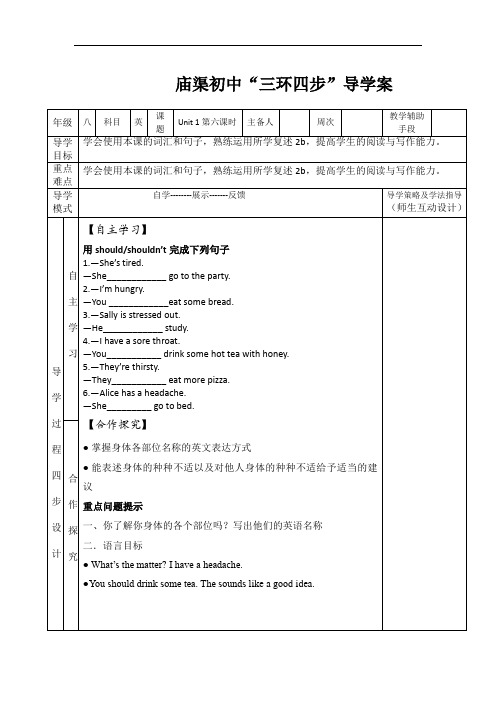
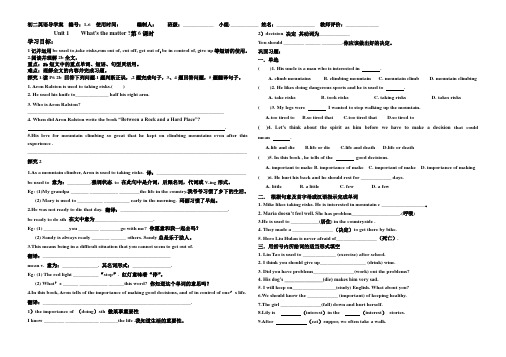
初二英语导学案编号:1-6 使用时间:编制人:班级:____________ 小组:___________ 姓名:_______________ 教师评价:_____________Unit 1 What’s the matter ?第6课时学习目标:1记并运用be used to,take risks,run out of, cut off, get out of,be in control of, give up等短语的使用。
2.阅读并理解2b全文,重点:2b短文中的重点单词、短语、句型灵活用。
难点:理解全文的内容并完成习题。
探究1.读P6 2b 回答下列问题.1题判断正误,,2题完成句子,3、4题回答问题,5题翻译句子。
1. Aron Ralston is used to taking risks.( )2. He used his knife to_____________ half his right arm.3. Who is Aron Ralston?_____________________________________________________________________________4.When did Aron Ralston write the book “Between a Rock and a Hard Place”?.5.His love for mountain climbing so great that he kept on climbing mountains even after this experience .______________________________________________________________________________________ 探究21.As a mountain climber, Aron is used to taking risks. 译:___________________________________ be used to 意为:_________,强调状态. to 在此句中是介词,后跟名词,代词或V-ing形式。
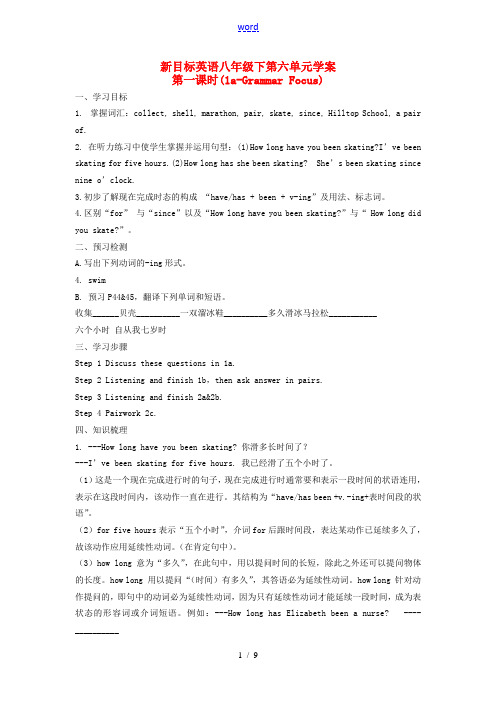
新目标英语八年级下第六单元学案第一课时(1a-Grammar Focus)一、学习目标1.掌握词汇:collect, shell, marathon, pair, skate, since, Hilltop School, a pair of.2. 在听力练习中使学生掌握并运用句型:(1)How long have you been skating?I’ve been skating for five hours.(2)How long has she been skating? She’s been s kating since nine o’clock.3.初步了解现在完成时态的构成“have/has + been + v-ing”及用法、标志词。
4.区别“for”与“since”以及“How long have you been skating?”与“ How long did you skate?”。
二、预习检测A.写出下列动词的-ing形式。
4. swimB. 预习P44&45,翻译下列单词和短语。
收集______贝壳__________一双溜冰鞋__________多久滑冰马拉松___________六个小时自从我七岁时三、学习步骤Step 1 Discuss these questions in 1a.Step 2 Listening and finish 1b,then ask answer in pairs.Step 3 Listening and finish 2a&2b.Step 4 Pairwork 2c.四、知识梳理1. ---How long have you been skating? 你滑多长时间了?---I’ve been skating for five hours. 我已经滑了五个小时了。
(1)这是一个现在完成进行时的句子,现在完成进行时通常要和表示一段时间的状语连用,表示在这段时间内,该动作一直在进行。
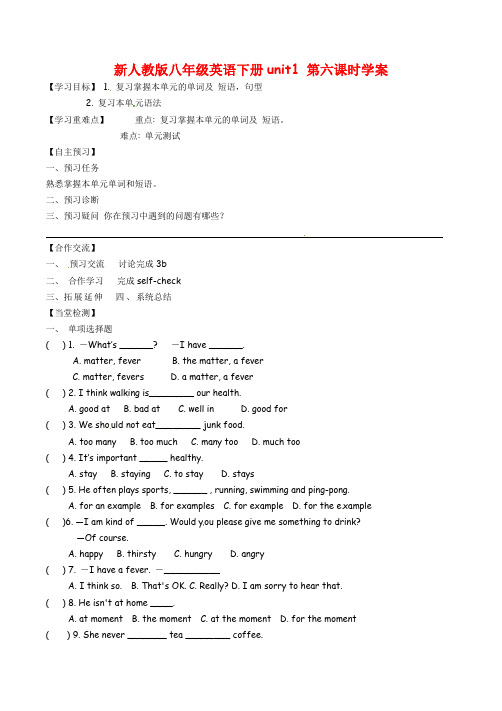
新人教版八年级英语下册unit1 第六课时学案【学习目标】1.复习掌握本单元的单词及短语,句型2. 复习本单元语法【学习重难点】重点: 复习掌握本单元的单词及短语。
难点: 单元测试【自主预习】一、预习任务熟悉掌握本单元单词和短语。
二、预习诊断三、预习疑问你在预习中遇到的问题有哪些?【合作交流】一、预习交流讨论完成3b二、合作学习完成self-check三、拓展延伸四、系统总结【当堂检测】一、单项选择题( ) 1. -What’s ______? -I have ______.A. matter, feverB. the matter, a feverC. matter, feversD. a matter, a fever( ) 2. I think walking is________ our health.A. good atB. bad atC. well inD. good for( ) 3. We sho uld not eat________ junk food.A. too manyB. too muchC. many tooD. much too( ) 4. It’s important _____ health y.A. stayB. stayingC. to stayD. stays( ) 5. He often plays sports, ______ , running, swimming and ping-pong.A. for an exampleB. for examplesC. for exampleD. for the e xample ( )6. —I am kind of _____. Would y ou please give me something to drink?—Of course.A. happyB. thirstyC. hungryD. angry( ) 7. -I have a fever. -__________A. I think so.B. That's OK.C. Really?D. I am sorry to hear that.( ) 8. He isn't at home ____.A. at momentB. the momentC. at the momentD. for the moment ( ) 9. She never _______ tea ________ coffee.A. drink; andB. doesn’t drink; orC. drinks; orD. drink; with( ) 10. Tony ______.A. is stress outB. stress outC. is stressed out D stressed out( ) 11. You shouldn’t eat _____ 24 hours.A. something, inB. nothing, forC. anything, forD. everything, at( ) 12. Brian doesn’t like __________ .A. readingB. readC. readsD. readed( )13. -You are stressed out. You should listen to some music.-That __________ a good idea.A. soundsB. sounds likeC. likeD. sound like( )14. I have a lot of _____.A. headachesB. headacheC. the headacheD. a headache( )15. -How are you? -____________.A. I’m not feel well.B.I don’t feeling wellC. I’m not feeling wellD.I don’t feel good( ) 16. They enjoy_____ music every day.A. listenB. listeningC. listening toD. to listen( )17.-Do you think I should help him? -Yes, I think____.A. soB. itC. noD. too( )18. I didn’t understand the whole (整个的)thing_____she told (告诉)me the secret(秘密).A. untilB. whenC. afterD. because( )19. You look pale(苍白). You _____ see the doctor.A. shou ldB. have toC. do D can( ) 20. You should drink hot tea ________ honey.A. inB. withC. ofD. at二、书面表达(共10分)。
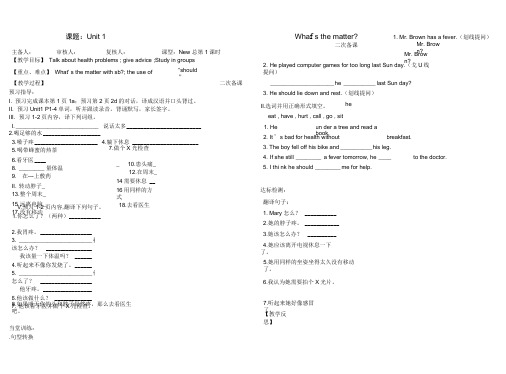
课题:Unit 1Wha f s the matter?1. Mr. Brown has a fever.(划线提问)二次备课Mr. Brow n? 主备人: 审核人: 复核人: 课型:New 总第1课时 【教学目标】 Talk about health problems ; give advice ;Study in groups【重点、难点】 What' s the matter with sb?; the use ofMr. Brow n?“should ” 【教学过程】 预习指导: I. 预习完成课本第1页1a ;预习第2页2d 的对话,译成汉语并口头背过。
II. 预习Unit1 P1-4单词,听并跟读录音,背诵默写,家长签字。
III. 预习1-2页内容,译下列词组。
I. __________________________ 说话太多 __________________________ 2.喝足够的水 ____________________ 3.嗓子疼 ______________________ 4.躺下休息 _______________________ 5. 喝带蜂蜜的热茶 6. 看牙医 ____8. ________ 量体温 9. 在---上敷药 II. 转动脖子_ 13.整个周末_15.远离电脑_17.没有移动7.做个X 光检查 _10.患头痛_12.在周末_14需要休息 __ 16用同样的方式18.去看医生二次备课2. He played computer games for too long last Sun day.(戈U 线提问)____________________ he __________ last Sun day? 3. He should lie down and rest.(划线提问) heII.选词并用正确形式填空。
eat , have , hurt , call , go , sit1. Heun der a tree and read a book.2. It ' s bad for health without breakfast.3. The boy fell off his bike and __________ his leg.4. If she still ________ a fever tomorrow, he ____5. I thi nk he should ________ me for help.to the doctor.V.预习1-2页内容,翻译下列句子。
八年级下Unit1 What’s the matter?Period6 Section B (3a-Self Check) 写作课Teaching and Learning Goals:一、功能(Functions):1. Express how to describe one’s health and give advice with sentences:What’s the matter with…?…have/has a……should/shouldn’t…2. Revise this unit and l earn to look after other people’s health and make good friendships. (出示目标,引导学生明确本课所要达到的知识,能力情感目标。
)二、词汇和常用表达(Words & expressions):1. Review and learn the vocabularies: death, give up…2. Talk about health problems with have and give advice with modal verb should/shouldn't ;三、学习策略(Strategies):1. Provide healthy problems with the target language.2. Improve students' oral English and writing ability.3. Guide the students to write their conversations about healthy problems.四、文化知识(Culture):Educate students to look after their health and learn to care forothers.Teaching and learning steps:Step I. Review1. Ask: Do you know these vocabularies about "body"? Try to write them down..2. 英汉互译(1)感冒_________________ (2)胃痛_________________ (3)背疼_________________ (4)牙疼_________________ (5)嗓子疼_________________ (6)发烧_________________(7)lie down and rest ___________ (8)hot tea with honey_________________(9)see a dentist_______________ (10)drink lots of water _________________【设计意图】本环节既复习了本单元里有关身体部位的单词,又为本课的重点写作学习做铺垫。
八年级英语下册全册学案(人教版)篇一:人教版新目标八年级英语下册全教案(2014)教学目标:1语言目标:描述健康问题的词汇,及如何根据别人的健康问题提建议。
2 技能目标:能听懂谈论健康问题的对话材料;能根据别人的健康问题提建议;能写出重点单词和重点句型,并能描述怎样对待健康问题。
3 情感目标:通过开展扮演病人等活动,培养学生关心他人身体健康的品质。
通过本课的阅读,培养学生处理紧急事件的基本能力,树立紧急事件时互相帮助的精神。
教学重点:短语: have a stomachache, have a cold, lie down, take one’s temperature,go to a doctor, get off, to one’s surprise, agree to do sth., get into trouble,fall down, be used to, run out (of), cut off , get out of, be in control of ,keep on (doing sth.), give up句子: 1 What’s the matter? I have a stomachache. Youshouldn’t eat so much next time. 2 What’s the matter with Ben?He hurt himself. He has a sore back.He should lie down and rest.3 Do you have a fever? Yes, I do. No, I don’t. I don’t know.4 Does he have a toothache? Yes, he does.He should see a dentist and get an X-ray.5 What should she do? She should take her temperature.6 Should I put some medicine on it? Yes, you should No, you shouldn’t.教学难点:掌握情态动词should \shouldn’t. 的用法;学习have的用法。
自主、合作、探究:Task1.1. 小组合作完成3a的表格。
2. 通过观察图片及表格信息,小组合作完成3. 完成self check,并核对答案。
( )2.She can’t see clearly. Something is wrong with his____ A. legs B. eyes C. ears D. stomach ( )3.If you have a sore throat, you should drink some hot tea____ honey. A. with B. in C. on D. has ( )4. How are you? I’m not____ A. feel well B. feel good C. feeling well D. feeling good ( )5. There is____ snow here. It’s ____ cold. A. too much, much too B. much too, too much C. too, too D. much, much ( )6. Bob should____ because he is very thirsty. A. eat food B. drink water C. go to bed D. take a walk ( )7.Do you brush your____ twice a day? Yes, I do. A. eyes B. mouth C. tooth D. teeth ( ) 8.There is____ with him, he will be all right soon. A.something serious B. serious something C. nothing serious D.serious nothing ( ) 9. My hope is____ a teacher. A. to become B. becoming C. become D. became ( ) 10.His finger is bleeding, please put some____ it. A. medicines on B. medicine in C. medicine on D. medicines in ( ) 11.Someone got____ in the head. A. hit B. wash it C. hits D. is hit ( ) 12.I dropped in the water while____. A. boat B. to boat C. boating D. a boat ( ) 13.The lost boy hoped____. A. to find B. to be found C. find D. finding ( ) 14.How are your parents? They____ fine. A. are both B. both are C. are all D. all are ( ) 15.Idon’t know when____. When he____, I will call you. A. will he come, will come B. he will come, comes C. he comes, will come D. does he come, comes Ⅱ.适当词型填空 1.He has trouble____(work) out the math problem because it is too difficult for him. 2.Be careful, or you will cut____(you). 3.My mother often burned herself while____(cook). 4.He____(cut)his finger when he fell down during P.E. class. 5.I am having____(difficult)in doing this work. 6.Look out! The bus____(come). 7.If he comes tonight, I____(tell)him the news. 8.The sky is dark, it____(rain).9.I____(hear)the news last week. 10.We have to make a____(decide). Ⅲ.翻译句子(20分,每题2分) 1.医生给我的胳膊包扎了绷带。
精品“正版”资料系列,由本公司独创。
旨在将“人教版”、”苏教版“、”北师大版“、”华师大版“等涵盖几乎所有版本的教材教案、课件、导学案及同步练习和检测题分享给需要的朋友。
本资源创作于2020年8月,是当前最新版本的教材资源。
包含本课对应内容,是您备课、上课、课后练习以及寒暑假预习的最佳选择。
人教版八年级英语下册导学案本课教学反思英语教案注重培养学生听、说、读、写四方面技能以及这四种技能综合运用的能力。
写作是综合性较强的语言运用形式, 它与其它技能在语言学习中相辅相成、相互促进。
因此, 写作教案具有重要地位。
然而, 当前的写作教案存在“ 重结果轻过程”的问题, 教师和学生都把写作的重点放在习作的评价和语法错误的订正上,忽视了语言的输入。
这个话题很容易引起学生的共鸣,比较贴近生活,能激发学生的兴趣, 在教授知识的同时,应注意将本单元情感目标融入其中,即保持乐观积极的生活态度,同时要珍惜生活的点点滴滴。
在教授语法时,应注重通过例句的讲解让语法概念深入人心,因直接引语和间接引语的概念相当于一个简单的定语从句,一个清晰的脉络能为后续学习打下基础。
此教案设计为一个课时,主要将安妮的处境以及她的精神做一个简要概括,下一个课时则对语法知识进行讲解。
在此教案过程中,应注重培养学生的自学能力,通过辅导学生掌握一套科学的学习方法,才能使学生的学习积极性进一步提高。
再者,培养学生的学习兴趣,增强教案效果,才能避免在以后的学习中产生两极分化。
在教案中任然存在的问题是,学生在“说”英语这个环节还有待提高,大部分学生都不愿意开口朗读课文,所以复述课文便尚有难度,对于这一部分学生的学习成绩的提高还有待研究。
本资源的初衷,是希望通过网络分享,能够为广大读者提供更好的服务,为您水平的提高提供坚强的动力和保证。
内容由一线名师原创,立意新,图片精,是非常强的一手资料。
本课教学反思本节课主要采用过程教案法训练学生的听说读写。
过程教案法的理论基础是交际理论,认为写作的过程实质上是一种群体间的交际活动,而不是写作者的个人行为。
课题:Unit 1 What's the matter?第1课时Section A 1a-2c ________年_____月____日学习目标:(1)掌握并灵活运用本课的重点词汇matter stomachache foot neck stomach fever lie lay rest cough toothache headache(2)重点短语have a cough have a stomachache take one‘ s temperature lie down(3)能够正确描述身体各部位名称,准确表达身体的种种不适; 对他人身体的种种不适表示同情并给予适当的建议;对他人建议做出适当的反应。
预习1.Task1: 英汉互译talk too much cut myself____________have a fever___________ take a break_______ see a dentist in the same way患感冒胃疼喉咙痛加蜂蜜的茶整个周末喝足够的水躺下休息Task2:1. What‘s the matter?-- I have a ____________( stomach)2 My sister didn‘t go to school because she has a ____________(tooth).3Look! Our baby has three ___________(tooth) now.4--What‘s the matter with your father? He talks less than before.-Oh, he ____ (have) a sore throat.5. 怎么了?我牙痛。
______________________ __________6.What’s up with you?(同义句)What‘s _____ _____ with you?What‘s _______ with you?7. My back hurts(痛)(同义句) I have _____ ______back.8.他怎么了?他患牙疼.9. I have a s___________, so I want to eat nothing.10.I have a fever, I have to take my t______.学习:Task 1 :1.What's the matter? 怎么了?出了什么事儿吗?What's the matter(with sb/sth)?= What’s wrong(with sb/sth)?=What’s the trouble (with …)—We've bought a new TV.—What __ ___ _______with the old one?‘―我们买了台新电视。
‖―那台旧的怎么了?‖a.matter 作动词用,意为“事关紧要;要紧;有重大影响”—I'm afraid I forgot that book again.—It doesn't matter .―很抱歉,我又忘了把那本书带来了。
‖―没事儿。
‖b.no matter who, what, where, etc. 意为“不论…;无论…;不管…”Call me when you get there, no matter what the time is.无论什么时间,你到了那儿就给我打电话。
You look fed up. ?你满脸不高兴的样子。
怎么啦?Carole, ? You don't seem happy.卡萝尔,出什么事了?你好像不开心。
--'Did I wake you?' --'Yes, but____________' --―我把你吵醒了?‖--―是的,不过没关系。
‖_________what you say, I like to listen.不管你说什么,我都喜欢听。
Task 2 : 补充完整下列表达身体部位疼痛的词并大声朗读它们。
have a head____; 胃疼_____; 牙疼______; have a _______ back; have a _______ throat; have a c_______; have a f________; 你怎么了?________ ___________ ?3.知识链接:“should”是一个____ 动词,它的意思是_____,它的否定形式是_____,意思又是_____。
should 1)没有人称和数的变化2)后接动词原形3)否定式Should not=shouldn’t4. hot tea with honey 热蜜蜂茶句中“with”为_____________之意自主学习:1.浏览Page2上2a方框中内容,完成下列短语翻译。
发烧_____________; 躺下休息______________; 喝大量的水_____________;看牙医__________; 加蜂蜜的热茶___________ ;看牙医/医生;拍x光片____________; 患咳嗽的病_____________;伤到自己_____________;量体温__________;敷上药_____________;嗓子疼_______________;目标达成检测(10分):★必做题根据首字母提示和句意提示填空。
1.I have a toothache, I have to see a d______.2.She is tired, she should go to bed early, she s______ go to the party.3.When you have a headache, please lie down and r______.4. I have a t____ __, so I want to see a dentist.5.–I have a stomachache .- You shouldn’t eat a______ .6.Open your m______ and say “AH” .7. It’s a good habit to brush your t ______twice a day .☆发展题二、用所给单词的适当形式填空。
1. I‘m feelin g terrible, I have a _______ (stomach).2.You should ______ (drink) enough water every day. Our body needs much water.3.I think everyone has two________(foot)4.When you have a stomachache, you shouldn‘t eat ____________(something).举一反三(改错)课题:Unit 1 What's the matter?第2课时Section A 2d+Grammar Focus ________年_____月____日学习目标:(1)熟悉并丰富对身体健康状况的询问及回答。
(2)能够正确描述身体各部位名称,准确表达身体的种种不适; 对他人身体的种种不适表示同情并给予适当的建议;对他人建议做出适当的反应。
a.预习: should情态动词should和can ,may ,must一样,没有人称和数的变化,但都不能单独作谓语,必须和后面的动词原形一起构成谓语。
should 作为情态动词,通常用来表示现在或将来的责任或义务,译作“______;应当;可以”。
✧You _____ tell your mother about it at once.你应该立即把此事告诉你妈妈。
✧He should work harder. 他____更加努力。
✧You _____ _____ your mother with the housework. 你应该帮你母亲做家务。
✧You ______ _____ soccer in the street. 你们不应该在街上踢足球。
should有时表示应当做或发生的事,例如:✧We should help each other.我们应当互相帮助。
含有情态动词should 的句式变化1)肯定句式:主语+should+________ eg: ________________________他应该量下体温2)否定句式:主语+______+动词原形+其他。
eg: _________________你不应该吃那么多。
3)疑问句式:should+主语+动词原形+其他eg: ____________________(我该看牙医吗?)_____________(她该怎么办?)b.【月勿忘其所能】复习七下p.111-112情态动词have to与must。
选have to与must相关形式词填空1)You don‘t ______ come if you don‘t want to. 如果你不想来,就不必来。
2)You _____talk to your mother like that.不准那样跟你妈妈讲话。
3)Mr. Wang knew he _______ act quickly.4)He told the passengers that he_______ take the man to the hospital. (p.3)5)He knew that he would ______ dosomething to save his own life.他知道他必须做点什么来挽救自己的生命。
(8下p.6)6)When they get older, they __________ do housework.当他们长大后,他们将不得不做家务。
(8下p.22)学习:Task 1 :I sat in the same way for too long______ ________.我以同样的姿势坐久了而没有活动(p.2)。
The bus driver stopped the bus _______________ twice.公交车司机没有多想(毫不犹豫)便停下了车(p.3)。
Please bring her to the party without telling her. 请在不告诉她的情况下,带她来参加聚会。